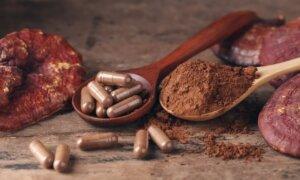Mushrooms are delicious in savory dishes and rich in antioxidants, minerals, and vitamins, but until recently, you probably never considered adding them to your coffee.
Health Benefits
A 2023 review highlights the powerful health benefits of medicinal mushrooms, including their antidiabetic, antioxidant, anti-cancer, and immune properties. Medicinal mushrooms not only help combat oxidative stress but also may slow the aging process and help regulate metabolism.They are also highly nutritious, thanks to their abundance of micronutrients and vitamins. They are particularly notable for containing vitamins A and E, as well as vitamin D2—one of few sources of this form of vitamin D. Additionally, they are packed with B vitamins, offering a valuable nutrient source for vegans and vegetarians.
Expert Take
Jodi Duval, an Australia-based naturopathic physician with more than 15 years of experience and the founder of Revital Health, told The Epoch Times that mushroom coffee offers a variety of health benefits because of the bioactive compounds found in medicinal mushrooms.- Lion’s mane enhances cognitive function by promoting nerve growth factor production and protecting neurons.
- Reishi supports better sleep and reduces stress through immune modulation.
- Chaga offers antioxidant and anti-inflammatory effects.
- Cordyceps boosts energy levels by improving oxygen utilization and production of adenosine triphosphate, or cellular energy, making it particularly beneficial for athletes by enhancing stamina and endurance.
- Shiitake promotes heart health.
- Turkey tail strengthens the immune system and exhibits anti-cancer properties.
Who Benefits
Grace Derocha, registered dietitian, certified diabetes care and education specialist, and spokesperson for the Academy of Nutrition and Dietetics, told The Epoch Times that mushroom coffee might be the right fit for people who:- Need cognitive support: People experiencing brain fog, memory challenges, or difficulty concentrating might benefit from mushroom coffee, particularly blends containing lion’s mane.
- Engage in athletics or higher levels of activity: Mushroom coffee containing Cordyceps can help support endurance and enhance recovery.
- Need immune support: Mushrooms such as chaga and reishi are known for their immune-modulating and anti-inflammatory properties.
- Struggle with stress and anxiety management: People dealing with chronic stress, anxiety, or sleep disturbances may find that mushroom coffee with reishi is a great tool. Reishi is known for its adaptogenic, or stress-balancing, qualities, helping the body better manage stress and promote relaxation. It’s a helpful option for people looking for a beverage that won’t exacerbate stress levels and may even help them feel more grounded.
- Have caffeine sensitivities: Although mushroom coffee does contain some caffeine, many users report experiencing fewer side effects commonly associated with regular coffee, such as jitters, digestive issues, and caffeine crashes. (Mushrooms themselves don’t contain caffeine.) This could be attributed to the balancing and adaptogenic properties of the mushrooms, which help moderate the body’s stress response to caffeine.
How to Make Your Own Mushroom Coffee
“Making mushroom coffee is easy,” Duval said. “Simply combine mushroom extracts or blends with your choice of regular or decaffeinated coffee.”The earthy, umami flavor of the mushrooms beautifully complements the bitterness of the coffee, creating a well-balanced taste. For an extra boost, consider adding MCT oil or cinnamon. Medium-chain triglyceride (MCT) oil enhances brain function by providing rapid energy, while cinnamon offers anti-inflammatory benefits and helps regulate blood sugar levels. For optimal therapeutic effects, Duval advised always opting for organic mushroom products.
Derocha mentioned that there are several methods for preparing your own mushroom coffee. Using premade mushroom coffee blends, which contain dried and powdered mushrooms, is typically the easiest and most convenient option. For those seeking more potent effects, mushroom extracts can also be used.
She recommends starting with a small dose if you’re new to medicinal mushrooms—about half a teaspoon of powder or the minimum recommended dose for extracts. Gradually increase the amount as you become more accustomed to the taste and effects.
Feel free to enhance the taste by adding ingredients such as cinnamon, nutmeg, cacao, vanilla, or coconut milk. Some people also enjoy mixing their mushroom coffee with other adaptogens, such as ashwagandha or maca, to reap additional benefits, Derocha said. According to her, this combination can be particularly effective in promoting stress relief and balancing energy levels.
Cautions
“Mushroom coffee is generally well-tolerated. However, if you have complex health conditions or autoimmune disorders, it’s advisable to consult a health care professional before incorporating it into your routine,” Duval said.Some mushrooms, such as reishi and chaga, possess immune-modulating effects that could interact with certain medications (such as blood thinners) or medical conditions, she added.
“Mushroom coffee works most effectively when paired with a holistic lifestyle that includes proper hydration, balanced nutrition, regular physical activity, and stress management,” Duval said. “Customizing its use through functional health assessments can help ensure it meets individual health needs for the best results.”







